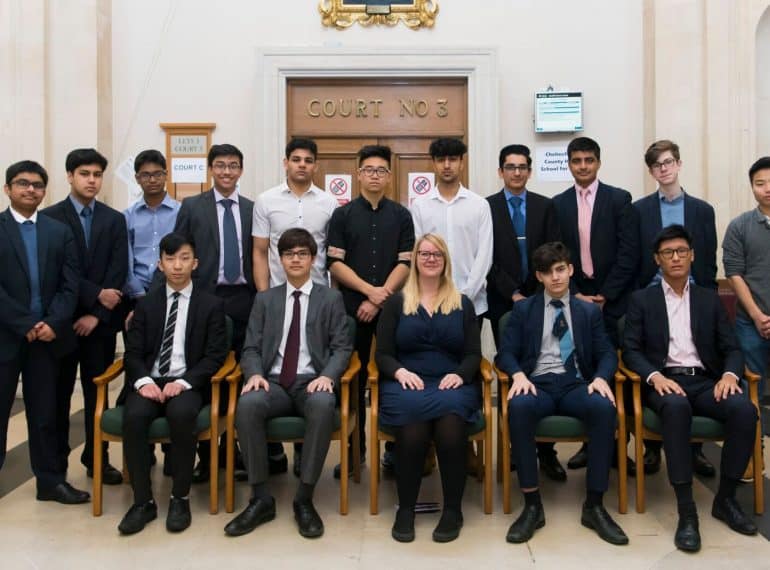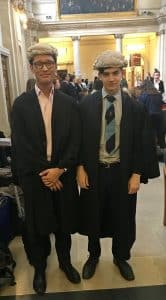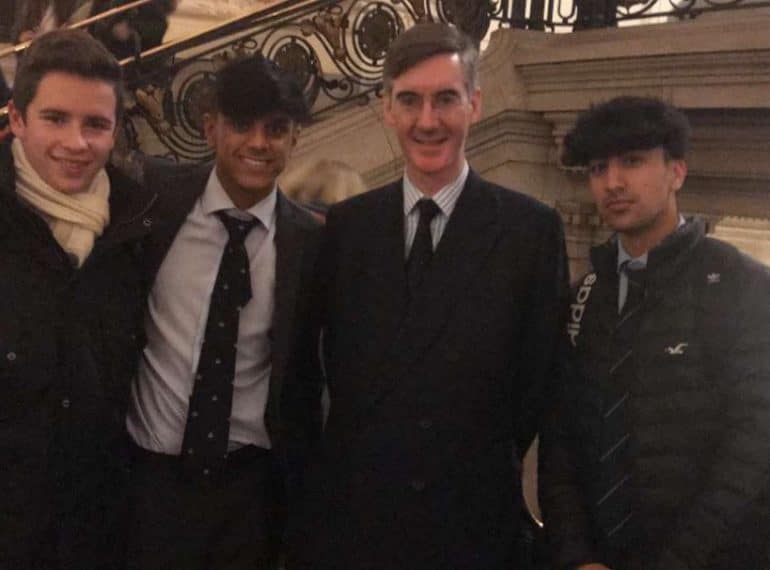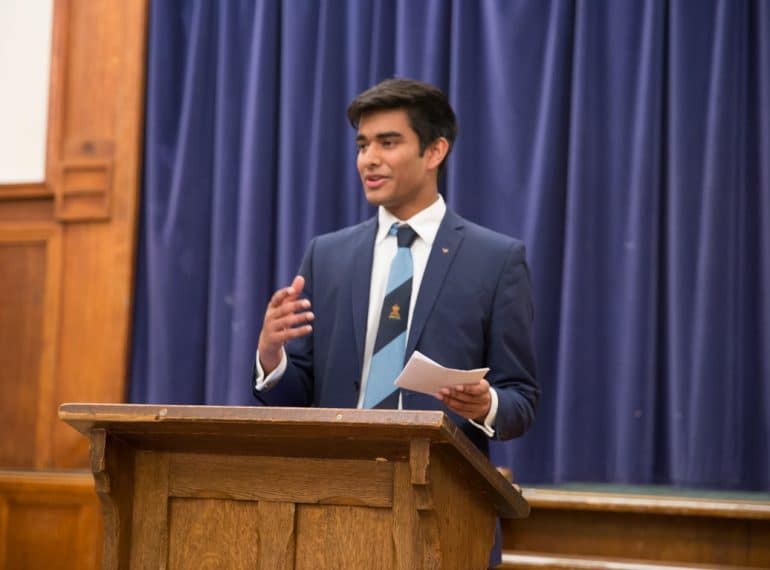
A team of senior QE boys have reached the national finals of a competition that involves mock criminal trials in a crown court in front of real judges.
The QE team performed strongly in three initial rounds at the regional finals of the Bar Mock Trial Competition, before emerging victorious from the final round, where they were pitted against the day’s other best-performing school, the Reach Academy.
After seeing off all 11 of the other shortlisted London state schools at the regional event at the Inner London Crown Court, they will now compete in the national finals at Cardiff Crown Court in March 2018.
English teacher Lucy Riseborough said: “The boys did extremely well and the judges commented on how well the ‘barristers’ in our cases performed.”
Each team comprised not only pupils playing the part of barristers, but also others needed to create a realistic court scene, from witnesses and jurors to court reporters and ushers.
The QE contingent prepared two different cases in the run-up to the event. One was a theft and fraud case involving a carer accused of stealing £1,320 from the man she was looking after. She used to do his shopping and claimed that she had accidentally taken his bank card home and had left it in a safe place. Since she lived with five other people, she argued that one of them could have accessed the card.
The second involved a charge of grievous bodily harm: a couple had an argument and the defendant broke his partner’s tibia. However, he claimed she threatened him with a knife and that he was acting in self-defence.
Teacher Tom Jack reported that the boys not only performed well, but also improved through each round, with third-round barristers Laurie Mathias and Mipham Samten learning from the judge’s feedback from the second round, when the QE barristers, Anake Singh and Saifullah Shah, had successfully prosecuted the same defendant.
“The two barristers therefore restricted their questioning to crucial facts, meaning that their closing argument was a mystery to the opposition until the very last moment. Confident performances from the witnesses for the defence (Hector Cooper and Viraj Mehta) put the prosecuting barristers under pressure, leading them to halt their questioning earlier than planned. By the time the jury retired, the result was just a formality; they found the defendant innocent on both charges.”
Having done so well in the three rounds, the boys knew they had a good chance of reaching the final, but were nevertheless excited and proud when this was confirmed.
“This achievement afforded the boys the opportunity to prosecute a case inside one of the main courtrooms, an experience nerve-wracking and enriching in equal measure.” The final round brought intense questioning on both sides and “a tangible impression of strategising from the respective barristers”, said Mr Jack, who teaches Music. “During the exchanges, the QE boys had to contend with one defence witness who clearly had the potential to intimidate the opposition and throw them off their game with her lengthy and convoluted responses. However, after neatly extracting the responses required from the ‘difficult customer’, Saifullah Shah’s closing statement tied up the various strands of the prosecution’s argument, leaving the jury to retire with a difficult decision.
“Although they were unable to reach a unanimous verdict, a majority decision narrowly found the defendant guilty, but the boys still needed the marks to go in their favour to claim a deserved victory. After deliberating for a good ten minutes, the judge returned with the news that the QE team had triumphed!”
The Bar Mock Trial Competition, which is open to young people aged 15-18, aims to give pupils insights into the justice system and encourages the development of skills such as logical reasoning, clear communication and teamwork. Now in its 26th year, the competition is run by the Citizenship Foundation and supported by the Bar Council of England and Wales, the Faculty of Advocates, the Bar Library of Northern Ireland, HM Courts & Tribunal Service, the Circuits and the Inns of Court.
The QE participants were as follows:
Barristers
Laurie Mathias, Year 12
Mipham Samten, Year 12
Saifullah Shah, Year 11
Anake Singh, Year 12
Jury
Alex Beard, Year 11
Nathan Chu, Year 12
Shivam Masrani, Year 12
Benjamin Suen, Year 12
Sajan Suganth, Year 11
Witnesses
Hector Cooper, Year 11
Kieran Dhrona, Year 11
Haider Jabir, Year 11
Viraj Mehta, Year 11
Court Clerk
Rivu Chowdhury, Year 11
Usher
Akram Ahmad, Year 11



 The final mirrored earlier rounds of the competition in which mock criminal trials were held in a Crown Court in front of real judges. The QE team took part in three trials, overcoming Woodroffe School from Lyme Regis by 91 points to 82 but losing narrowly to two other schools. This year’s overall champions were Wilmslow High School from Cheshire.
The final mirrored earlier rounds of the competition in which mock criminal trials were held in a Crown Court in front of real judges. The QE team took part in three trials, overcoming Woodroffe School from Lyme Regis by 91 points to 82 but losing narrowly to two other schools. This year’s overall champions were Wilmslow High School from Cheshire.



 English teacher Alex Ulyet said: “They held on to this right until the end and the only question was whether the Year 7 or Year 8 team would clinch the top spot, but Year 8 nudged in front by about two points.
English teacher Alex Ulyet said: “They held on to this right until the end and the only question was whether the Year 7 or Year 8 team would clinch the top spot, but Year 8 nudged in front by about two points. “Both teams seemed to really enjoy just being able to revel in their knowledge of children’s and young adult fiction. There was a sense that it left them with an even greater desire to go out and read some of the books which they heard questions about but had not yet read, which is of course the most important thing,” Mr Ulyet added.
“Both teams seemed to really enjoy just being able to revel in their knowledge of children’s and young adult fiction. There was a sense that it left them with an even greater desire to go out and read some of the books which they heard questions about but had not yet read, which is of course the most important thing,” Mr Ulyet added.